Organisational Behaviour Report: Culture, Power, Politics at Uber
VerifiedAdded on 2023/01/05
|15
|1361
|93
Report
AI Summary
This report provides an in-depth analysis of Uber's organizational behavior, examining the interplay of culture, power, and politics within the company. It begins with an introduction to organizational behavior and then delves into Uber's mission, vision, and aims. The report explores the relationships between culture, power, and politics, and their influence on Uber's organizational dynamics. It then investigates the development of culture within Uber, considering various theories and models. The report further discusses content and process theories of motivation, such as Maslow's and Mayo's theories, and their implications for employee behavior. Finally, it offers recommendations for improving employee motivation and concludes with a summary of key findings. The report highlights the impact of power and politics on Uber's workplace culture and its global expansion. It emphasizes the significance of motivation techniques like rewards, recognition, and continuous feedback in enhancing team effectiveness within Uber.
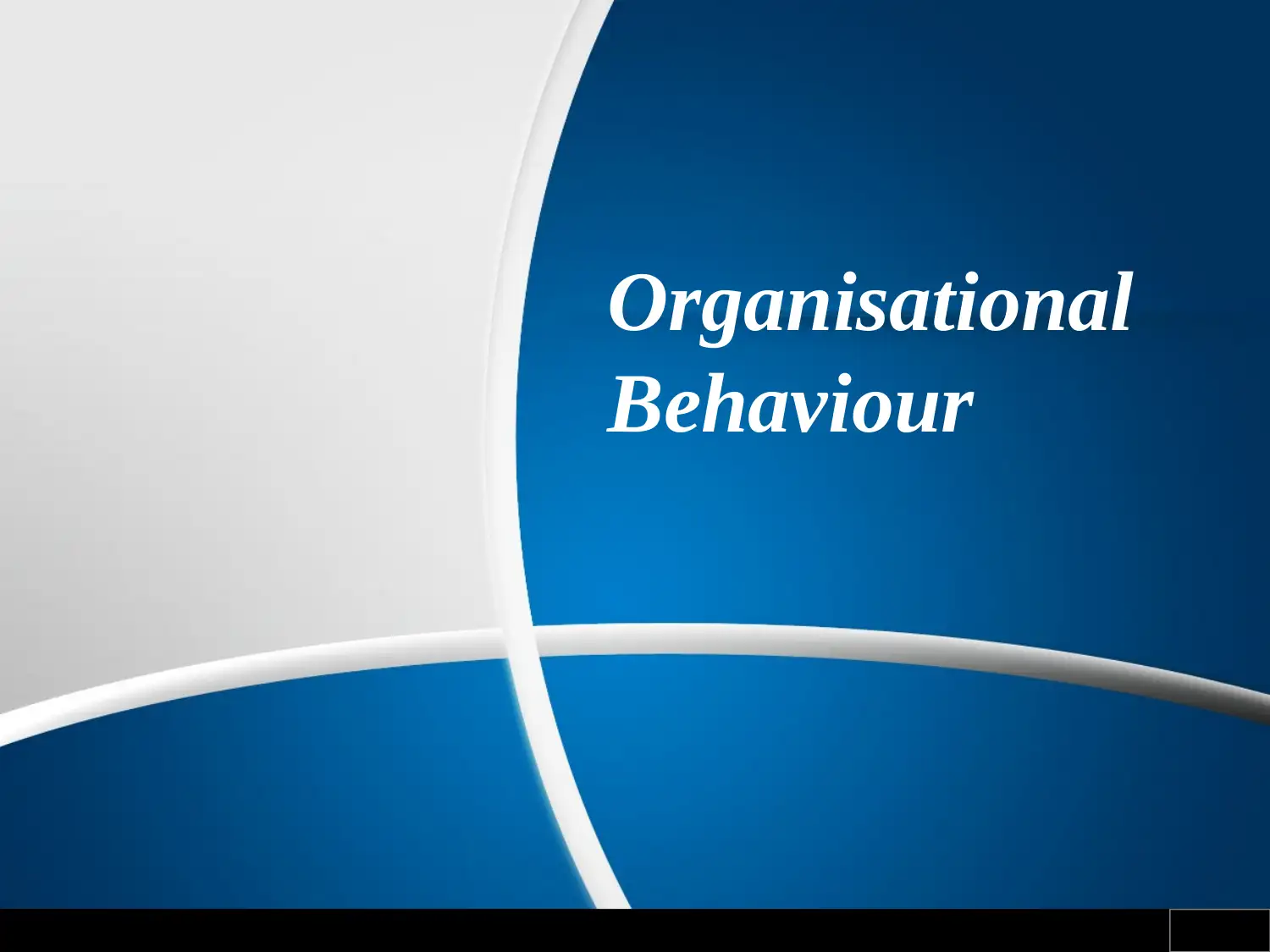
Organisational
Behaviour
Behaviour
Paraphrase This Document
Need a fresh take? Get an instant paraphrase of this document with our AI Paraphraser
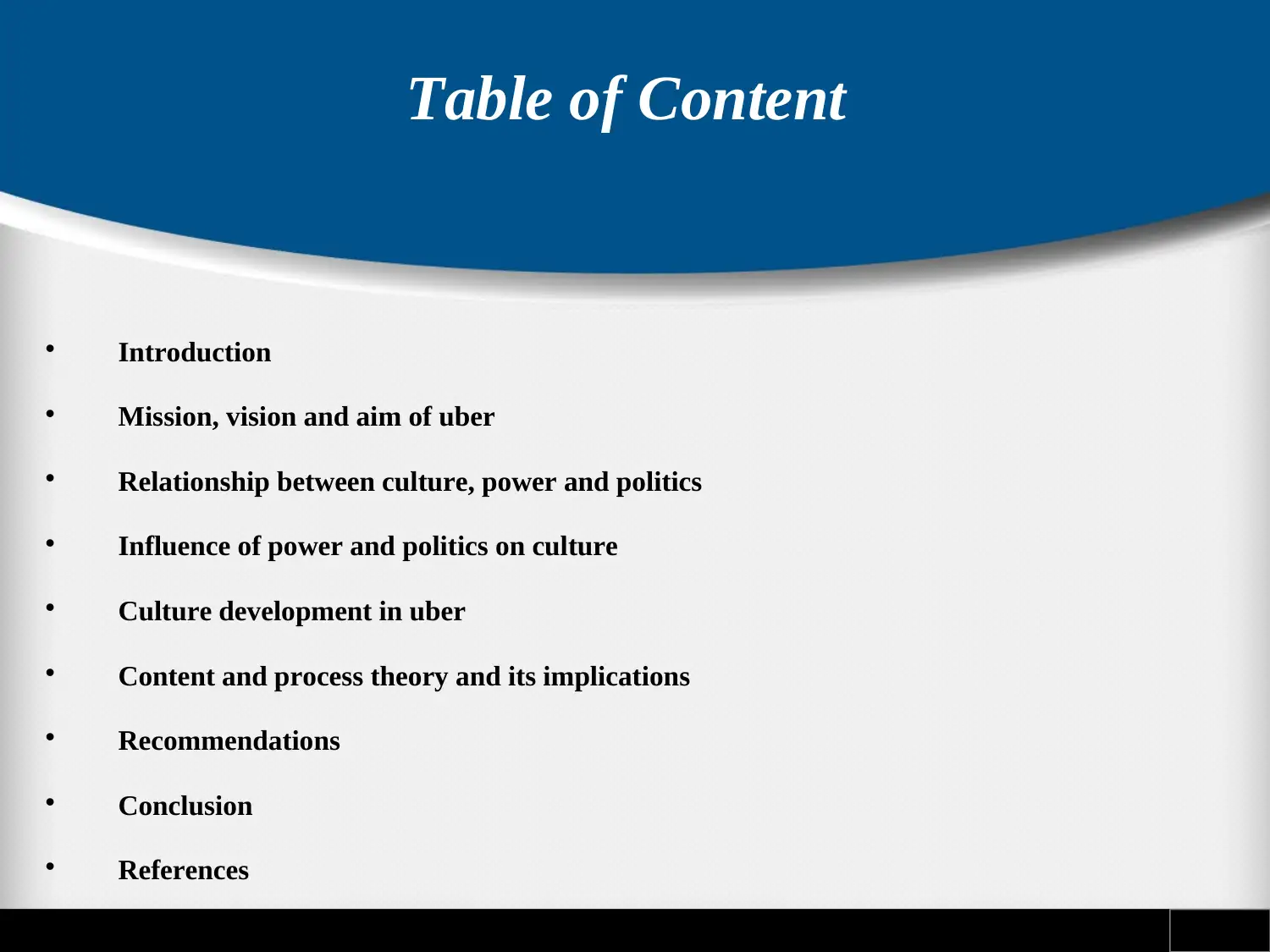
Table of Content
Introduction
Mission, vision and aim of uber
Relationship between culture, power and politics
Influence of power and politics on culture
Culture development in uber
Content and process theory and its implications
Recommendations
Conclusion
References
Introduction
Mission, vision and aim of uber
Relationship between culture, power and politics
Influence of power and politics on culture
Culture development in uber
Content and process theory and its implications
Recommendations
Conclusion
References
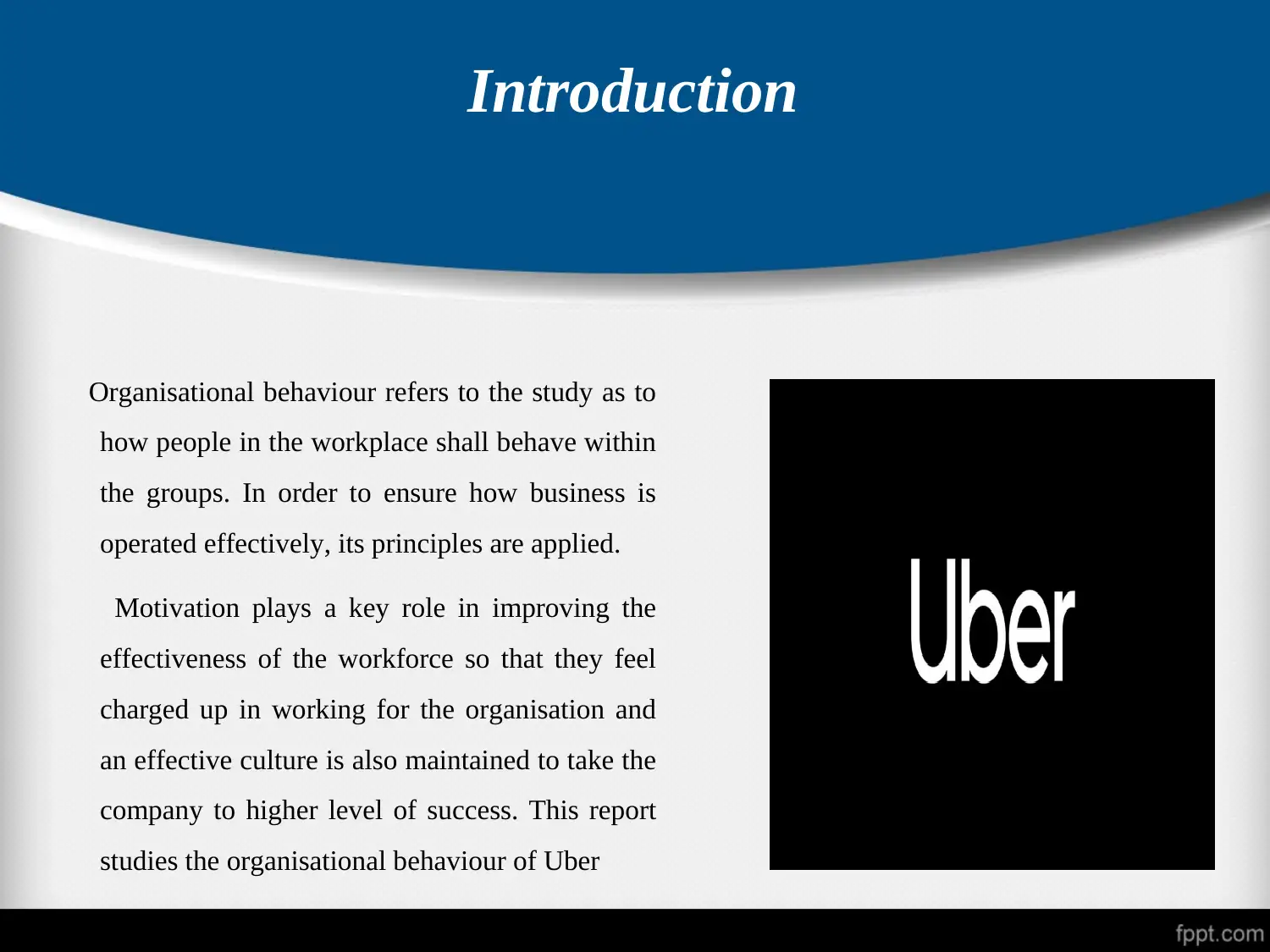
Introduction
Organisational behaviour refers to the study as to
how people in the workplace shall behave within
the groups. In order to ensure how business is
operated effectively, its principles are applied.
Motivation plays a key role in improving the
effectiveness of the workforce so that they feel
charged up in working for the organisation and
an effective culture is also maintained to take the
company to higher level of success. This report
studies the organisational behaviour of Uber
Organisational behaviour refers to the study as to
how people in the workplace shall behave within
the groups. In order to ensure how business is
operated effectively, its principles are applied.
Motivation plays a key role in improving the
effectiveness of the workforce so that they feel
charged up in working for the organisation and
an effective culture is also maintained to take the
company to higher level of success. This report
studies the organisational behaviour of Uber
⊘ This is a preview!⊘
Do you want full access?
Subscribe today to unlock all pages.

Trusted by 1+ million students worldwide
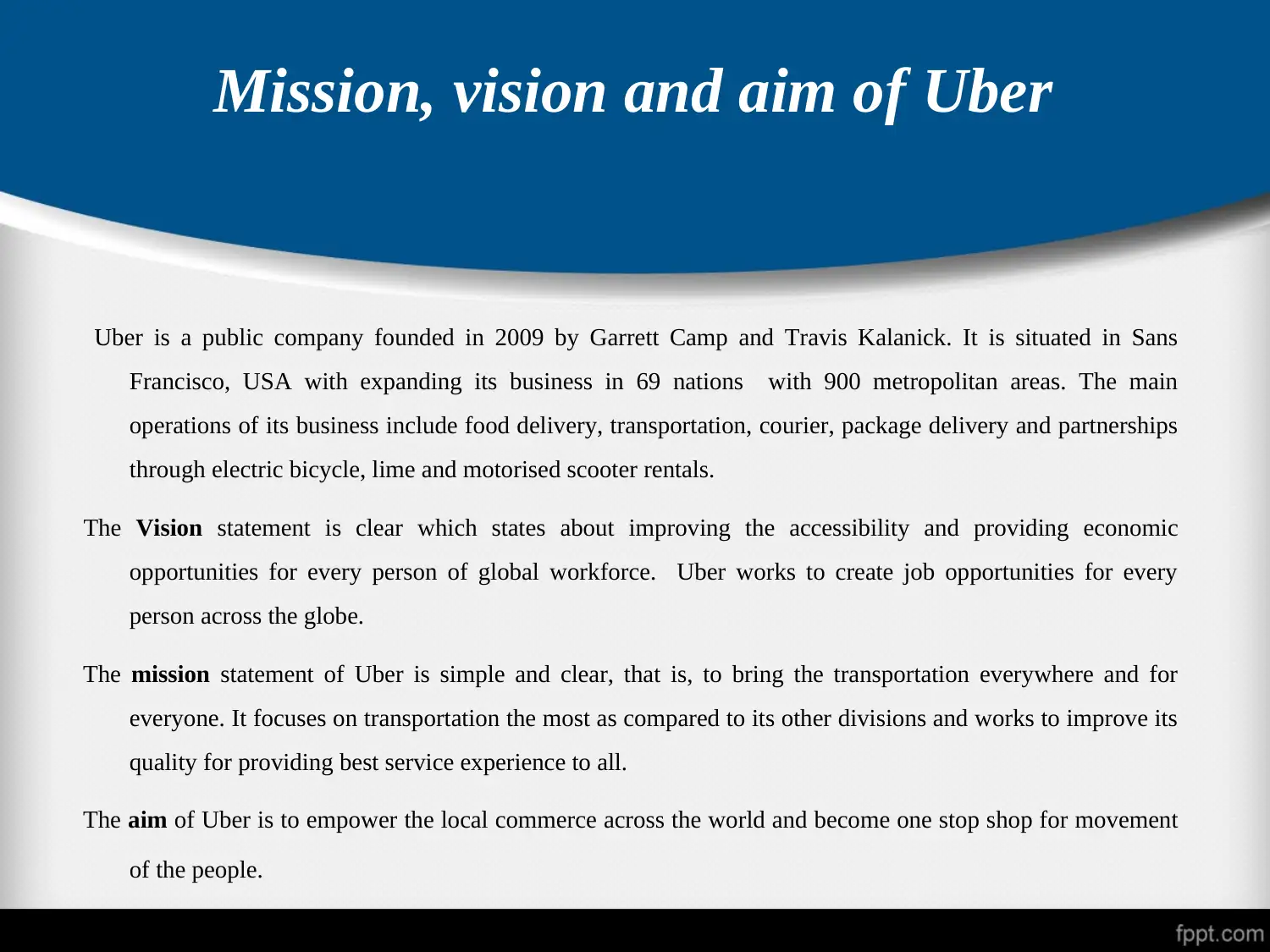
Mission, vision and aim of Uber
Uber is a public company founded in 2009 by Garrett Camp and Travis Kalanick. It is situated in Sans
Francisco, USA with expanding its business in 69 nations with 900 metropolitan areas. The main
operations of its business include food delivery, transportation, courier, package delivery and partnerships
through electric bicycle, lime and motorised scooter rentals.
The Vision statement is clear which states about improving the accessibility and providing economic
opportunities for every person of global workforce. Uber works to create job opportunities for every
person across the globe.
The mission statement of Uber is simple and clear, that is, to bring the transportation everywhere and for
everyone. It focuses on transportation the most as compared to its other divisions and works to improve its
quality for providing best service experience to all.
The aim of Uber is to empower the local commerce across the world and become one stop shop for movement
of the people.
Uber is a public company founded in 2009 by Garrett Camp and Travis Kalanick. It is situated in Sans
Francisco, USA with expanding its business in 69 nations with 900 metropolitan areas. The main
operations of its business include food delivery, transportation, courier, package delivery and partnerships
through electric bicycle, lime and motorised scooter rentals.
The Vision statement is clear which states about improving the accessibility and providing economic
opportunities for every person of global workforce. Uber works to create job opportunities for every
person across the globe.
The mission statement of Uber is simple and clear, that is, to bring the transportation everywhere and for
everyone. It focuses on transportation the most as compared to its other divisions and works to improve its
quality for providing best service experience to all.
The aim of Uber is to empower the local commerce across the world and become one stop shop for movement
of the people.
Paraphrase This Document
Need a fresh take? Get an instant paraphrase of this document with our AI Paraphraser
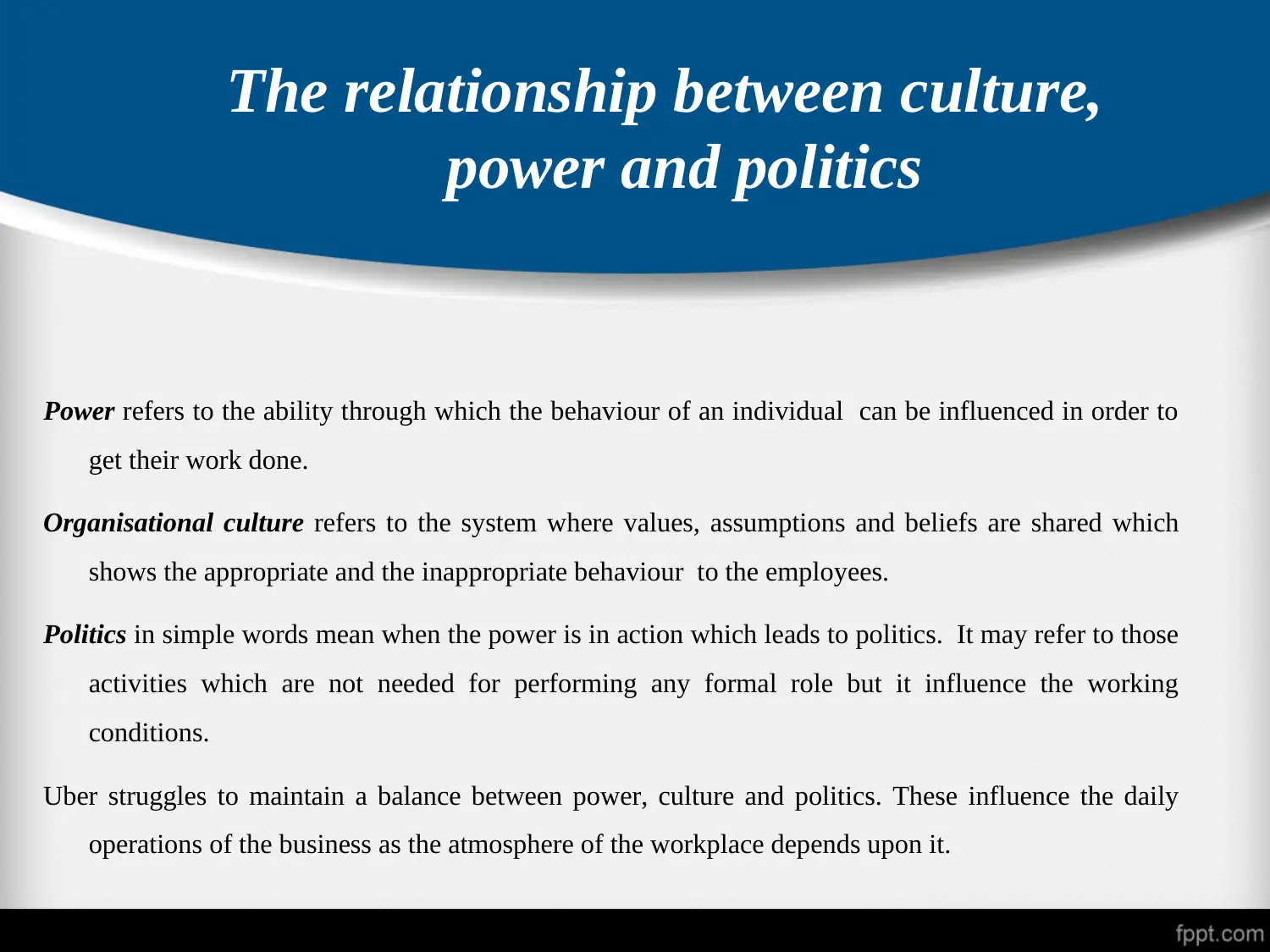
The relationship between culture,
power and politics
Power refers to the ability through which the behaviour of an individual can be influenced in order to
get their work done.
Organisational culture refers to the system where values, assumptions and beliefs are shared which
shows the appropriate and the inappropriate behaviour to the employees.
Politics in simple words mean when the power is in action which leads to politics. It may refer to those
activities which are not needed for performing any formal role but it influence the working
conditions.
Uber struggles to maintain a balance between power, culture and politics. These influence the daily
operations of the business as the atmosphere of the workplace depends upon it.
power and politics
Power refers to the ability through which the behaviour of an individual can be influenced in order to
get their work done.
Organisational culture refers to the system where values, assumptions and beliefs are shared which
shows the appropriate and the inappropriate behaviour to the employees.
Politics in simple words mean when the power is in action which leads to politics. It may refer to those
activities which are not needed for performing any formal role but it influence the working
conditions.
Uber struggles to maintain a balance between power, culture and politics. These influence the daily
operations of the business as the atmosphere of the workplace depends upon it.
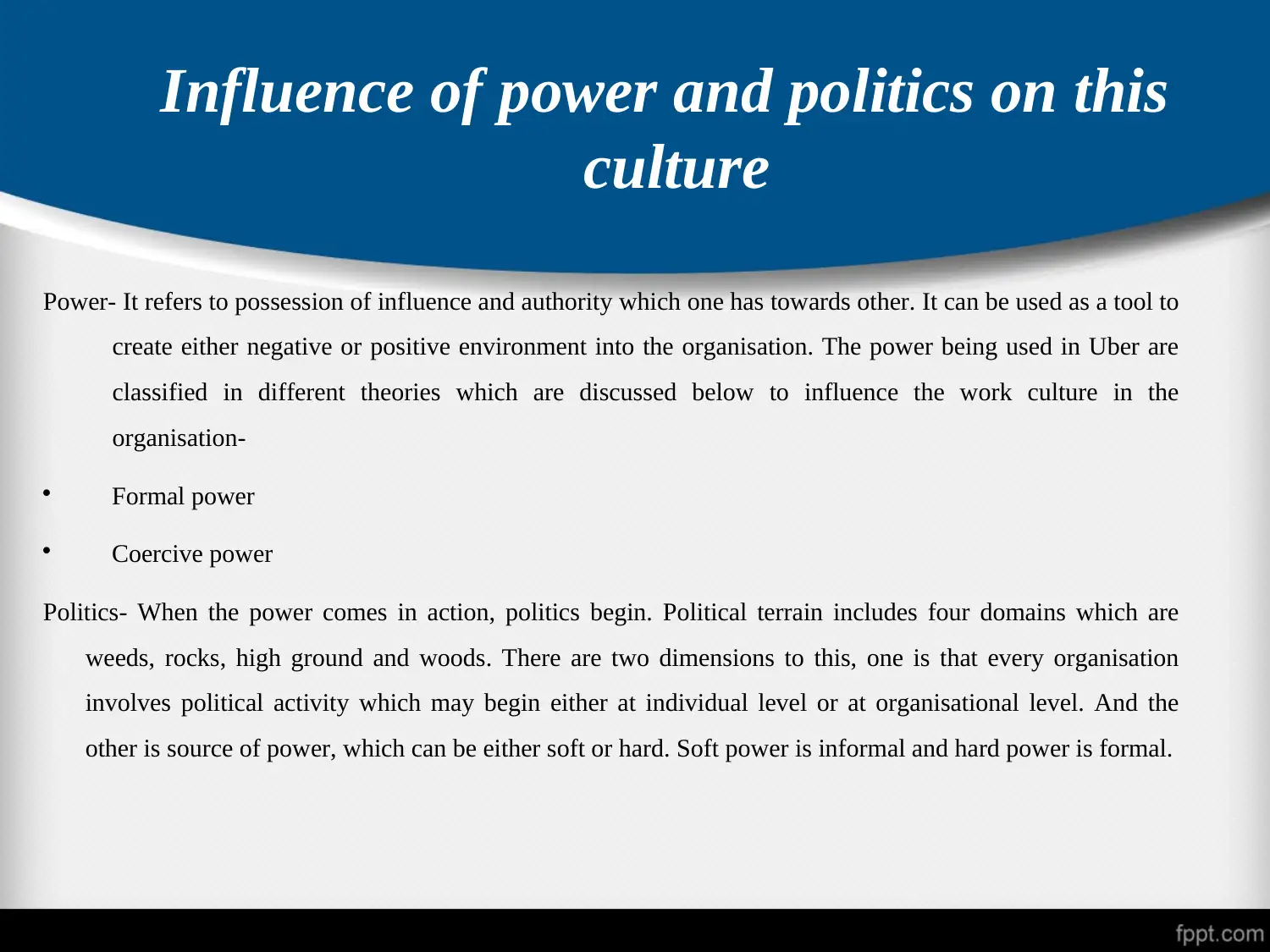
Influence of power and politics on this
culture
Power- It refers to possession of influence and authority which one has towards other. It can be used as a tool to
create either negative or positive environment into the organisation. The power being used in Uber are
classified in different theories which are discussed below to influence the work culture in the
organisation-
Formal power
Coercive power
Politics- When the power comes in action, politics begin. Political terrain includes four domains which are
weeds, rocks, high ground and woods. There are two dimensions to this, one is that every organisation
involves political activity which may begin either at individual level or at organisational level. And the
other is source of power, which can be either soft or hard. Soft power is informal and hard power is formal.
culture
Power- It refers to possession of influence and authority which one has towards other. It can be used as a tool to
create either negative or positive environment into the organisation. The power being used in Uber are
classified in different theories which are discussed below to influence the work culture in the
organisation-
Formal power
Coercive power
Politics- When the power comes in action, politics begin. Political terrain includes four domains which are
weeds, rocks, high ground and woods. There are two dimensions to this, one is that every organisation
involves political activity which may begin either at individual level or at organisational level. And the
other is source of power, which can be either soft or hard. Soft power is informal and hard power is formal.
⊘ This is a preview!⊘
Do you want full access?
Subscribe today to unlock all pages.

Trusted by 1+ million students worldwide
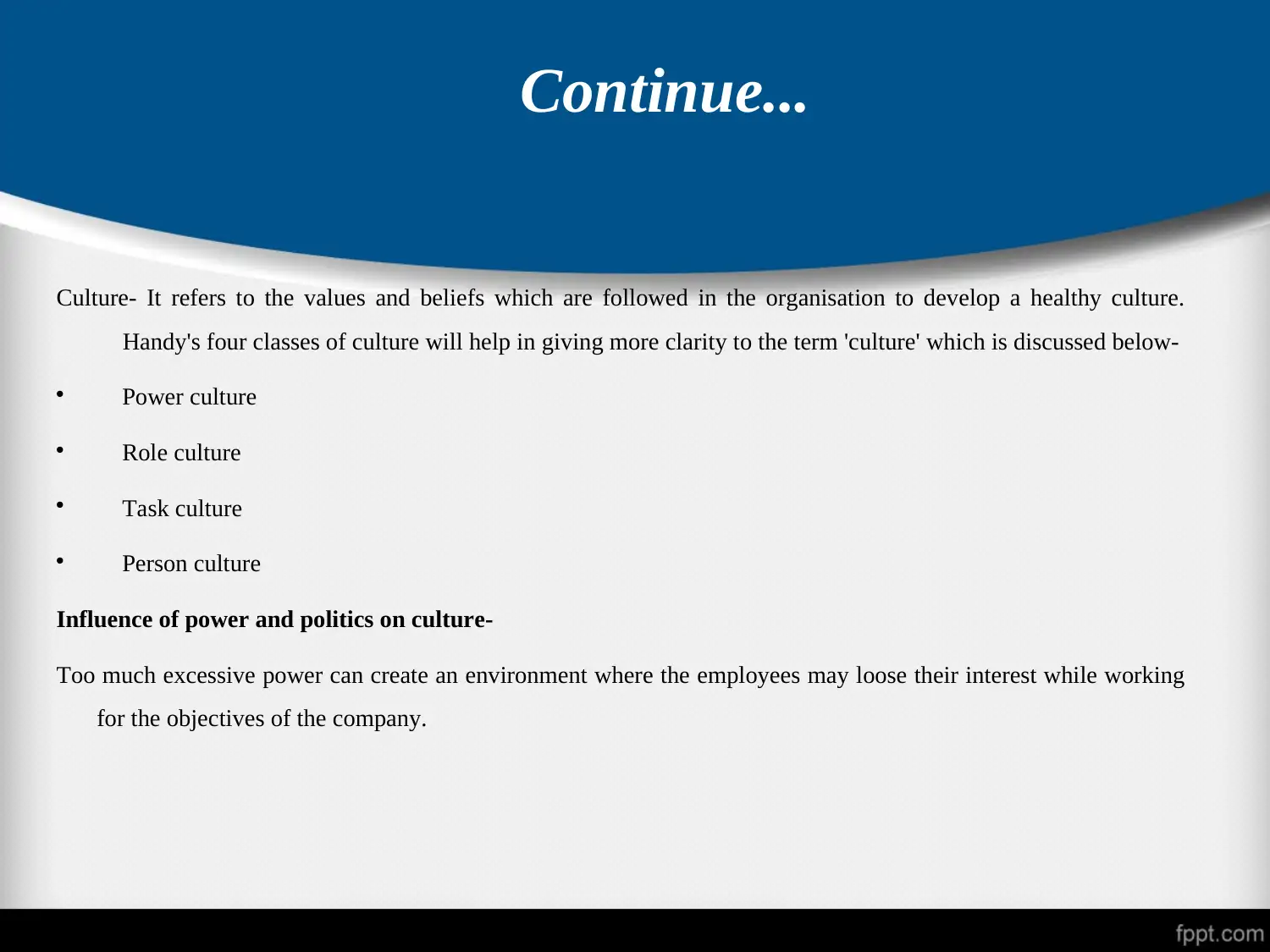
Continue...
Culture- It refers to the values and beliefs which are followed in the organisation to develop a healthy culture.
Handy's four classes of culture will help in giving more clarity to the term 'culture' which is discussed below-
Power culture
Role culture
Task culture
Person culture
Influence of power and politics on culture-
Too much excessive power can create an environment where the employees may loose their interest while working
for the objectives of the company.
Culture- It refers to the values and beliefs which are followed in the organisation to develop a healthy culture.
Handy's four classes of culture will help in giving more clarity to the term 'culture' which is discussed below-
Power culture
Role culture
Task culture
Person culture
Influence of power and politics on culture-
Too much excessive power can create an environment where the employees may loose their interest while working
for the objectives of the company.
Paraphrase This Document
Need a fresh take? Get an instant paraphrase of this document with our AI Paraphraser
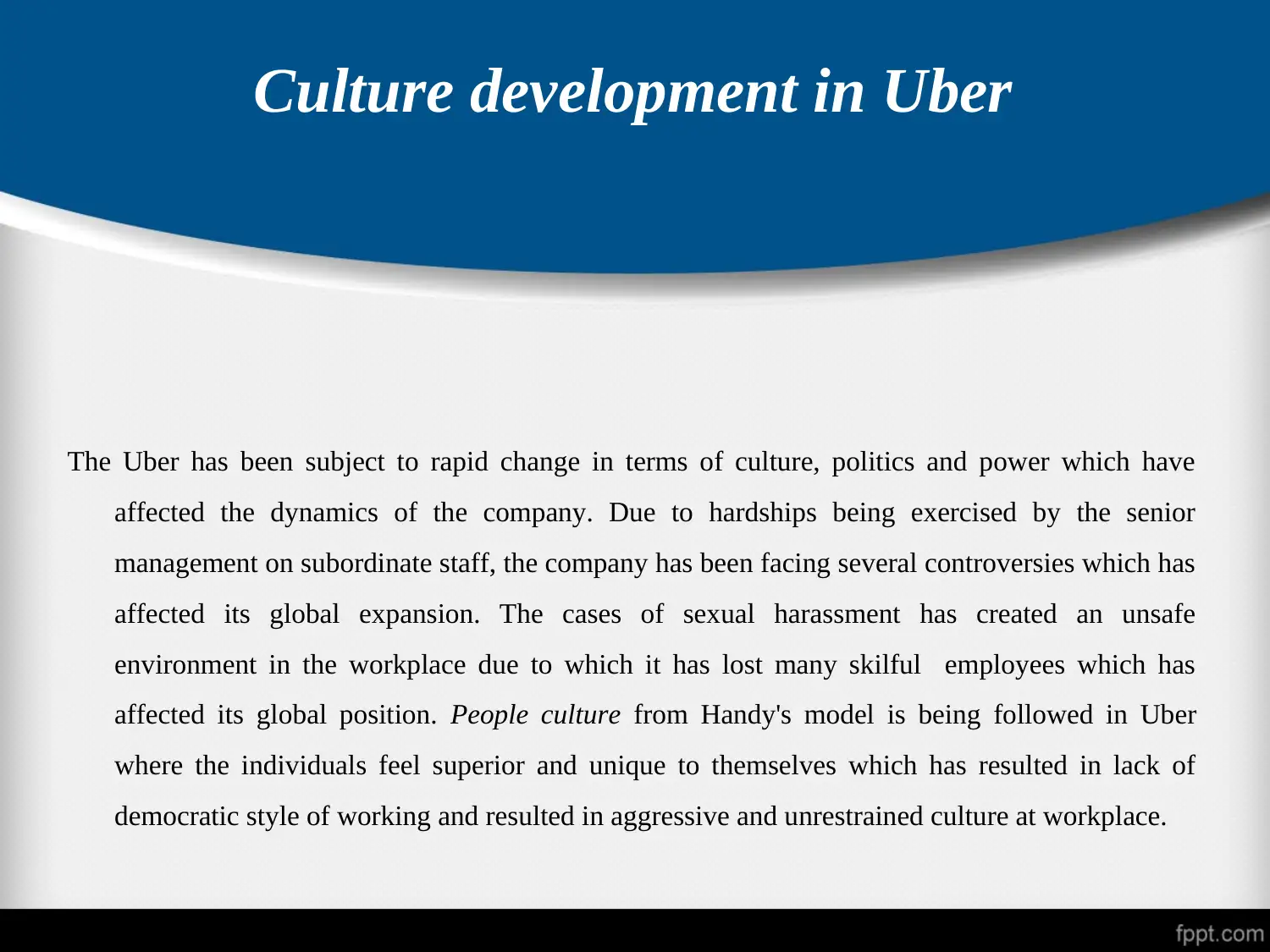
Culture development in Uber
The Uber has been subject to rapid change in terms of culture, politics and power which have
affected the dynamics of the company. Due to hardships being exercised by the senior
management on subordinate staff, the company has been facing several controversies which has
affected its global expansion. The cases of sexual harassment has created an unsafe
environment in the workplace due to which it has lost many skilful employees which has
affected its global position. People culture from Handy's model is being followed in Uber
where the individuals feel superior and unique to themselves which has resulted in lack of
democratic style of working and resulted in aggressive and unrestrained culture at workplace.
The Uber has been subject to rapid change in terms of culture, politics and power which have
affected the dynamics of the company. Due to hardships being exercised by the senior
management on subordinate staff, the company has been facing several controversies which has
affected its global expansion. The cases of sexual harassment has created an unsafe
environment in the workplace due to which it has lost many skilful employees which has
affected its global position. People culture from Handy's model is being followed in Uber
where the individuals feel superior and unique to themselves which has resulted in lack of
democratic style of working and resulted in aggressive and unrestrained culture at workplace.
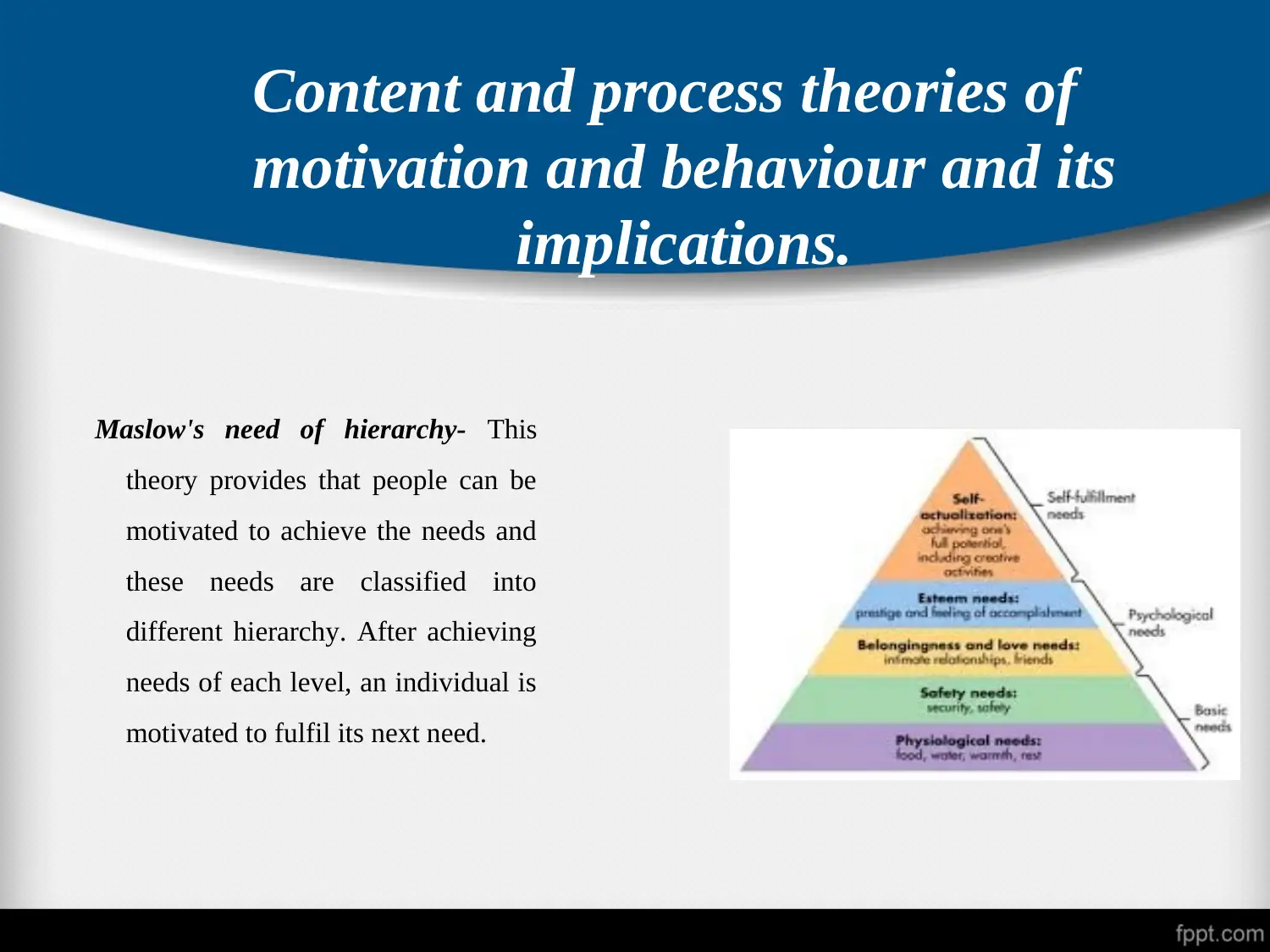
Content and process theories of
motivation and behaviour and its
implications.
Maslow's need of hierarchy- This
theory provides that people can be
motivated to achieve the needs and
these needs are classified into
different hierarchy. After achieving
needs of each level, an individual is
motivated to fulfil its next need.
motivation and behaviour and its
implications.
Maslow's need of hierarchy- This
theory provides that people can be
motivated to achieve the needs and
these needs are classified into
different hierarchy. After achieving
needs of each level, an individual is
motivated to fulfil its next need.
⊘ This is a preview!⊘
Do you want full access?
Subscribe today to unlock all pages.

Trusted by 1+ million students worldwide
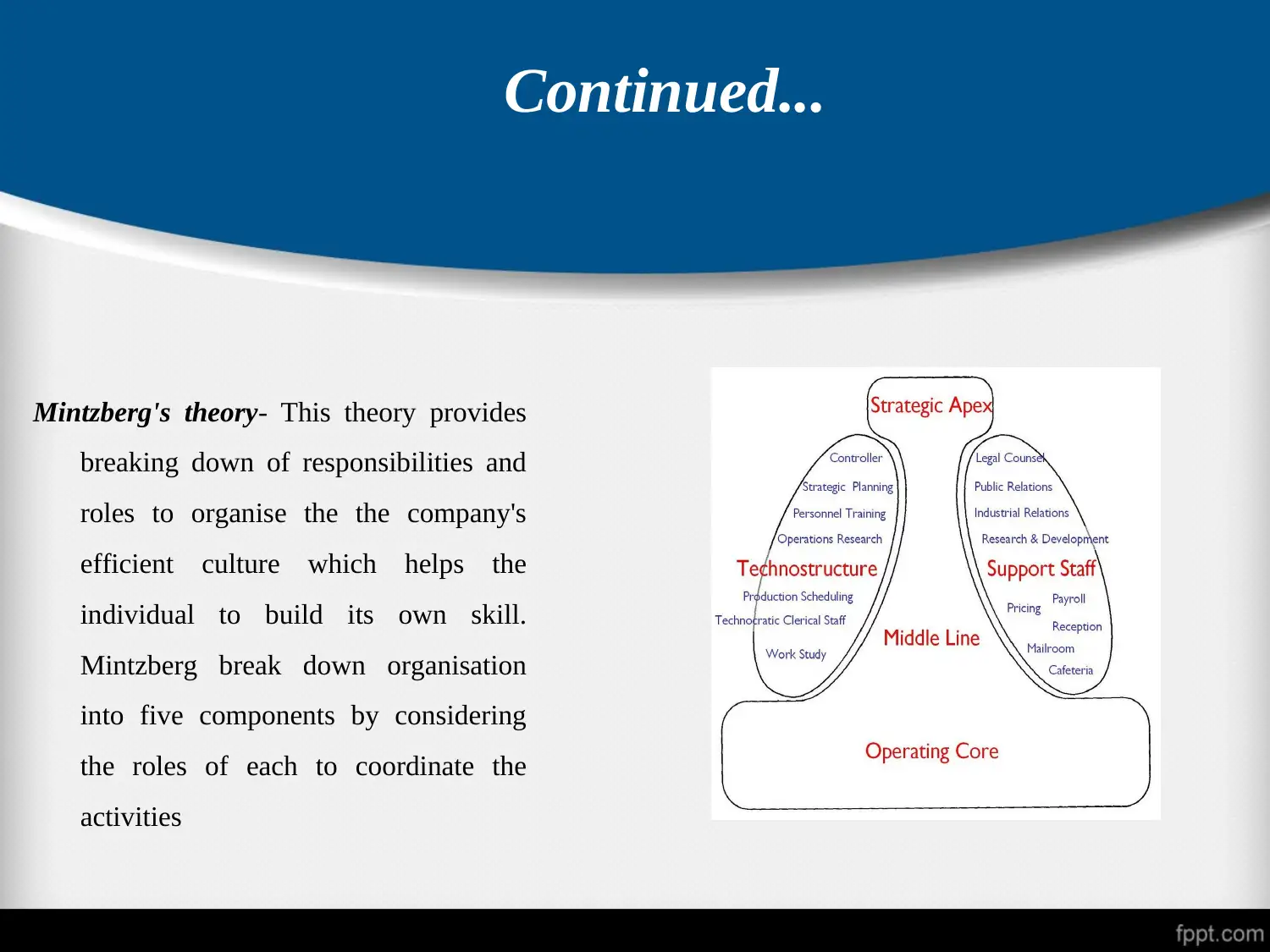
Continued...
Mintzberg's theory- This theory provides
breaking down of responsibilities and
roles to organise the the company's
efficient culture which helps the
individual to build its own skill.
Mintzberg break down organisation
into five components by considering
the roles of each to coordinate the
activities
Mintzberg's theory- This theory provides
breaking down of responsibilities and
roles to organise the the company's
efficient culture which helps the
individual to build its own skill.
Mintzberg break down organisation
into five components by considering
the roles of each to coordinate the
activities
Paraphrase This Document
Need a fresh take? Get an instant paraphrase of this document with our AI Paraphraser
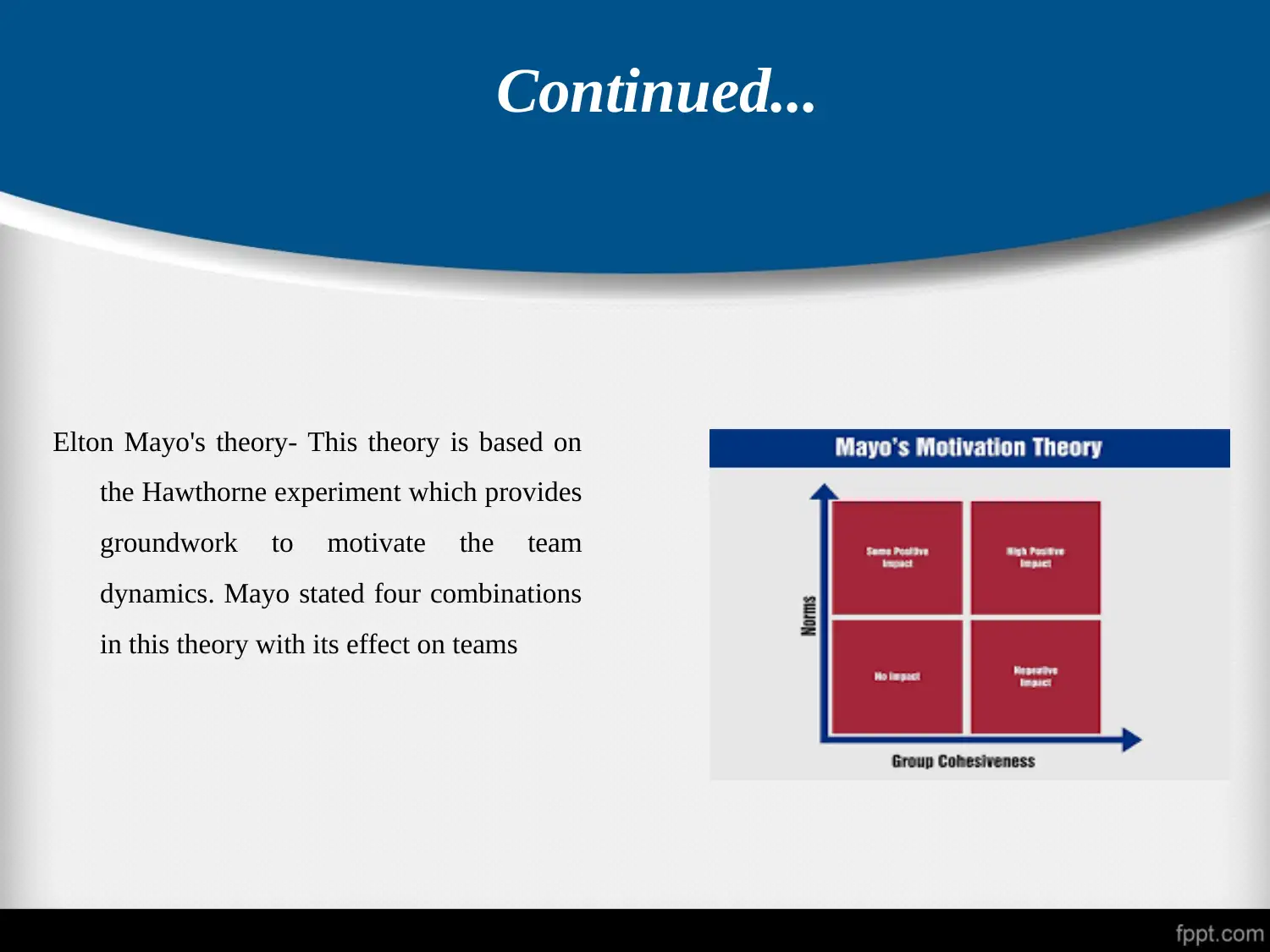
Continued...
Elton Mayo's theory- This theory is based on
the Hawthorne experiment which provides
groundwork to motivate the team
dynamics. Mayo stated four combinations
in this theory with its effect on teams
Elton Mayo's theory- This theory is based on
the Hawthorne experiment which provides
groundwork to motivate the team
dynamics. Mayo stated four combinations
in this theory with its effect on teams
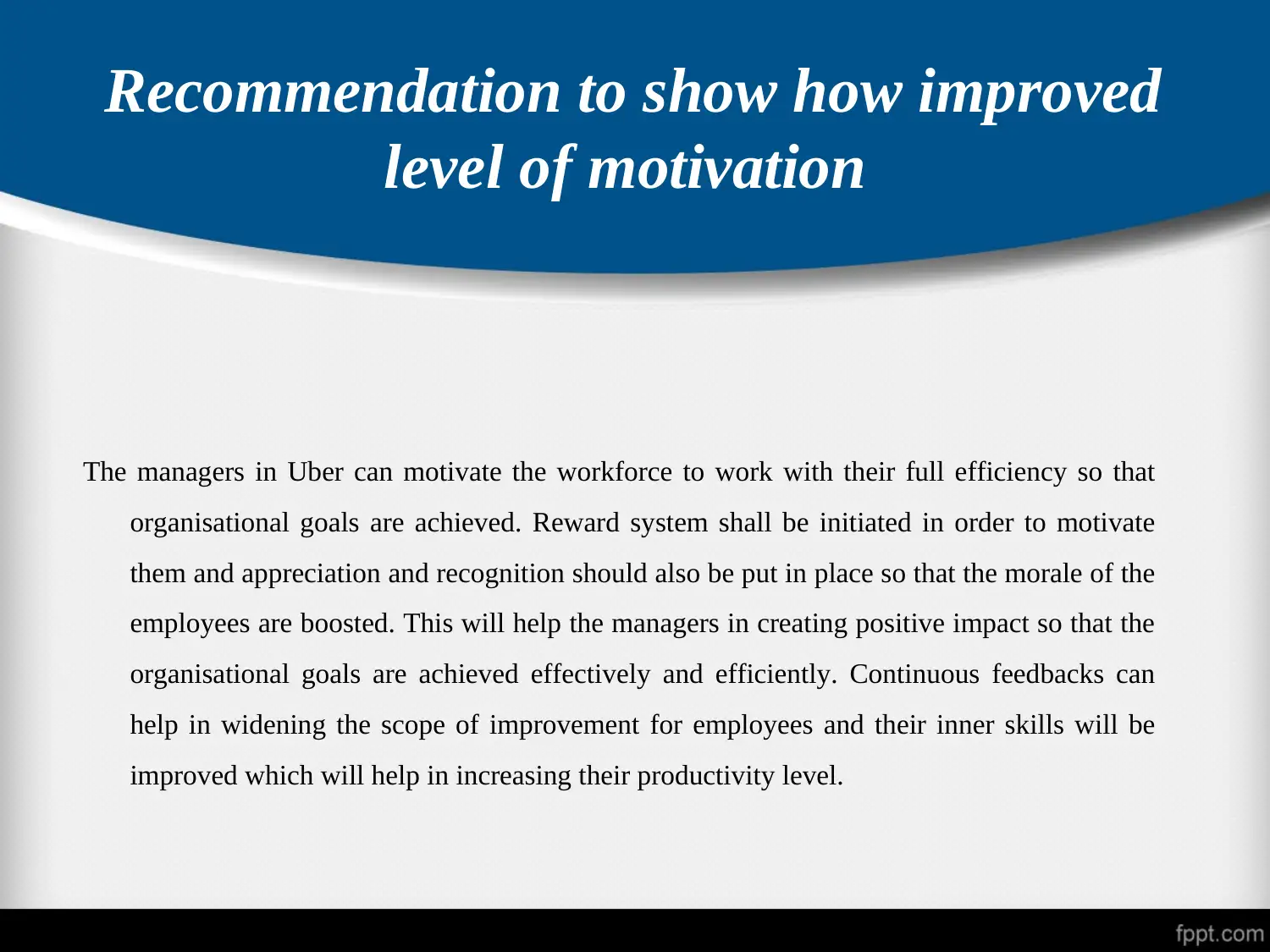
Recommendation to show how improved
level of motivation
The managers in Uber can motivate the workforce to work with their full efficiency so that
organisational goals are achieved. Reward system shall be initiated in order to motivate
them and appreciation and recognition should also be put in place so that the morale of the
employees are boosted. This will help the managers in creating positive impact so that the
organisational goals are achieved effectively and efficiently. Continuous feedbacks can
help in widening the scope of improvement for employees and their inner skills will be
improved which will help in increasing their productivity level.
level of motivation
The managers in Uber can motivate the workforce to work with their full efficiency so that
organisational goals are achieved. Reward system shall be initiated in order to motivate
them and appreciation and recognition should also be put in place so that the morale of the
employees are boosted. This will help the managers in creating positive impact so that the
organisational goals are achieved effectively and efficiently. Continuous feedbacks can
help in widening the scope of improvement for employees and their inner skills will be
improved which will help in increasing their productivity level.
⊘ This is a preview!⊘
Do you want full access?
Subscribe today to unlock all pages.

Trusted by 1+ million students worldwide
1 out of 15
Related Documents
Your All-in-One AI-Powered Toolkit for Academic Success.
+13062052269
info@desklib.com
Available 24*7 on WhatsApp / Email
![[object Object]](/_next/static/media/star-bottom.7253800d.svg)
Unlock your academic potential
Copyright © 2020–2026 A2Z Services. All Rights Reserved. Developed and managed by ZUCOL.





